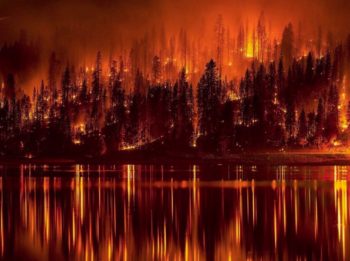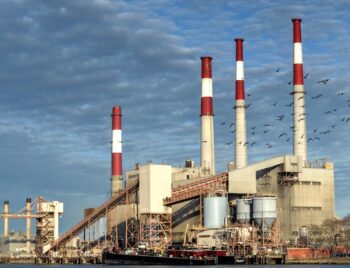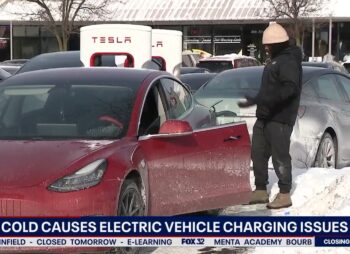
Bloomberg’s Chris Martin has a story on California’s troubles with one of my favorite headlines ever: “Californians Learning That Solar Panels Don’t Work in Blackouts.”
Apparently, many of California’s would-be Earth-savers had no idea that just putting solar panels on their roofs doesn’t mean they’ll have power when PG&E switches it off.
As Martin explains:
Most panels are designed to supply power to the grid — not directly to houses. During the heat of the day, solar systems can crank out more juice than a home can handle.
Conversely, they don’t produce power at all at night. So systems are tied into the grid, and the vast majority aren’t working this week as PG&E Corp. cuts power to much of Northern California to prevent wildfires.
The only way for most solar panels to work during a blackout is pairing them with batteries. That market is just starting to take off. Sunrun Inc., the largest U.S. rooftop solar company, said some of its customers are making it through the blackouts with batteries, but it’s a tiny group — countable in the hundreds.
Martin quotes Sunrun Chairman Ed Fenster explaining that solar power with local battery storage is “the perfect combination for getting through these shutdowns,” although he fails to mention just what an expensive proposition that is, especially in the rural areas most affected by California’s return to the primitive.
Fester, whose company sells those very batteries, expects battery sales “to boom” now that the promised blackouts have begun.
If you’re wondering what that smell is, it’s the scent of crony capitalism — and it stinks.
At UC Berkeley, where you’d expect all this planet-saving to be applauded, at least one student is probably less than thrilled.
ABC7 reports that biochem grad student Sarah Morris says that the recent outage — again, a planned and on-purpose outage — “may have destroyed two years of her ground-breaking cancer research, valued at $500,000.”
If you’re wondering what its value could have been to cancer victims who now might never receive the benefits of Morris’s research, I suspect you’re not alone.
Ironically, given that the blackouts are called “Public Safety Power Shut-Offs,” the California public is enjoying less safety every time the power goes off.
Even PG&E, who you would think might be better prepared for its own planned blackouts, is affected.
PG&E CEO Bill Johnson admitted last week, “Our website crashed several times. Our maps are inconsistent and may be incorrect. Our call centers were overloaded.” He added, “To put it simply, we were not adequately prepared to support the operational event.”
Way up north in my old stomping grounds of Eureka, Calif., you can see the immediate damage.
The WSJ spoke with Melanie Bettenhausen, who runs the Eureka location of the local North Coast Co-Op grocery chain — at least for now. (Full disclosure: I was a regular customer in the early ‘90s.) The Journal reports:
Ms. Bettenhausen, 44 years old, worked 34 hours straight to keep the store open, using generators to run the registers and dry ice to cool the food.
When she arrived Thursday morning, the walk-in refrigerator was full of spoiled dairy products. All of it—tens of thousands of dollars worth of food—would have to be thrown away.
“I don’t even know yet if we’re going to make it through this one,” she said. “Anyone looking at providing for their family and maintaining a living in this area has to be making plans.”
Indeed. The North Coast isn’t exactly California’s wealthiest region, long dependent on logging and fishing, which have both been curtailed by “experts” far away in Sacramento and Washington, D.C.
Now, they can’t even keep the milk cold for their kids. Or as the WSJ put it, the area is “subject to the sort of abrupt blackouts normally associated with underdeveloped countries.”
California, especially under the late Democratic Governor Pat Brown (Jerry’s far more competent father), invested in forward-looking infrastructure that was the envy of the nation.
But in more recent decades, water infrastructure has languished, putting Central Valley farmers at the mercy of the state’s notoriously fickle rains.
Victor Davis Hanson noted five years ago that the region “would have been depopulated long ago without the infrastructure that an earlier, wiser generation built and that latter-day regulators and environmentalists so casually deprecated.”
In the time since VDH wrote those words, Sacramento has grown only more hostile to the kind of infrastructure projects required by the state’s huge population.
And now, rather than clear the scrub, which makes California’s inherent wildfire problem so much worse, they’re turning out the lights — on the state’s people, on their medical research, on their businesses, on the state’s very future.
So if you were thinking of telling the last person to leave California to turn the lights off, don’t bother — they’ll be off already.
Read more at PJ Media

















I remember the 1993 Inaugural Day storm ravaged Seattle and the surrounding Puget Sound area. The entire region lost power. Driving at night was difficult in the total darkness. People are good at following the law that states a traffic light this isn’t working is to be treated as a four way stop sign, but it was often difficult to tell that we were coming to a traffic light. Stores and gas stations didn’t have power so everyone had to get by with what they had.
We used to take our camping trailer to square dance events where the power hook ups had limited amperage. I put two huge truck batteries in the trailer and used inverters to drive heavy loads, then re-charged the batteries as power was available. We quickly learned that if no power was available, the huge batteries didn’t last long. Batteries just don’t have that much storage capacity. Four things that do have good capacity are gasoline, diesel, propane, and where available natural gas. Residents likely to be hit by power outages should invest in generators rather than batteries that will disappoint them. Locally I’m sure they are sold out but they should be able to get them by using the internet.
Nobody gets it. The power was turned off because of fear of sparking from transmission lines. The lines don’t know if the electrical current is from wind, solar or fossil fuel sources!!!!
You are right. Perhaps the reason that articles and discussion cross over into climate change is most of us believe heavy reliance on renewables will lead to power outages.
At least one civilian died during the power blackouts when his medical device stopped as the power went off.
Well, California is quickly becoming a 3rd world banana republic so none of this is surprising.
I would like to see the llight go out in Hollywood while their filming some movie about Eco-Wackos trying to same the Rdwoods